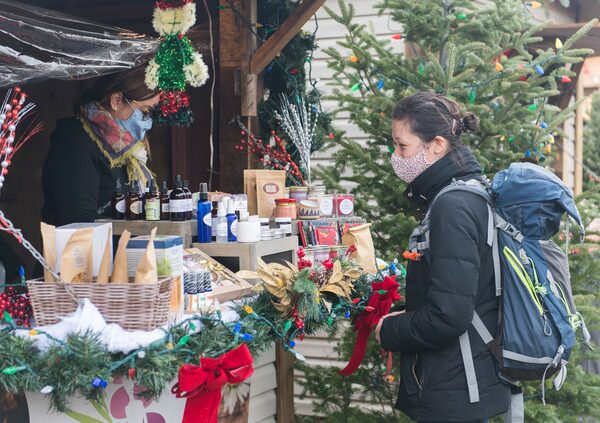
A woman wears a face mask as she shops at a Christmas market in Montreal, on Nov. 28, 2020.Graham Hughes/The Canadian Press
He told Quebeckers to put up the Christmas tree. He offered a holiday reprieve – albeit with as many caveats as a Christmas tree has ornaments. He said the grace period was at risk; he would decide if it was going ahead by Dec. 11. Finally, he called the whole thing off.
As Quebec Premier François Legault spent two weeks toying with a plan for holiday gatherings, its ever-changing details and prospects of survival consumed a province exhausted by months of lockdown but unable to control its second wave of coronavirus infections.
The collective psychodrama over the plan ended on Thursday when Mr. Legault announced gatherings between households would not be allowed in the regions, comprising most of the province, that have been under restrictions put in place by his government on Oct. 1.
Canada surpasses 400,000 reported COVID-19 cases as Trudeau warns of strain on hospitals
Ontario, Quebec see COVID-19 outbreaks at workplaces climb
The hope he ignited with a plan to allow four days of small get-togethers from Dec. 24 to 27, he now snuffed out. In the course of a nearly-hour-long news conference, the Premier turned from Père Noël into something more closely resembling the Grinch.
“I know we would all like to see our family,” he said, “but it’s not a good idea.”
Some health experts publicly rejoiced that the government was backtracking on an idea they had always considered risky. Dr. Diane Francoeur, president of La Fédération des médecins spécialistes du Québec, a group representing some 10,000 doctors in the province, said she understands the government had a balancing act on its hands, but she believes it made the right decision.
“Health care workers reinvent Christmas every year to continue caring for Quebeckers over the holidays,” she wrote in a statement. “This year, we’re asking the population to make this common effort for the first time.”
Quebec is following other provinces in barring or discouraging holiday gatherings. Ontario Premier Doug Ford urged residents to celebrate only with people in their household. In Manitoba on Thursday, Premier Brian Pallister issued a tearful plea for residents to stay at home on Dec. 25. “I’m the guy who’s stealing Christmas, to keep you safe,” he said.
But in Quebec, the government’s decision comes after two weeks of intensive media coverage and debate. On Nov. 19, Mr. Legault offered Quebeckers a “moral contract”: limit interactions for a week before and after, in exchange for four days of gatherings (maximum 10 people) starting on Christmas Eve.
The proposal was designed, he said, to provide some emotional respite for a province where social life has been strictly limited for more than two months by lockdown rules that closed restaurants, bars, and theatres, while prohibiting most private get-togethers. “We need to recharge our batteries,” Mr. Legault said.
The Premier also made it clear that the holiday breather could be cancelled if COVID-19 cases started climbing again, after plateauing in the fall, or if the health network was overwhelmed by the pandemic. The plan seemed designed as an inducement to good behaviour, as well as a beacon; step out of line, it warned, and you lose Christmas.
“His moral contract was like a Sword of Damocles over our heads,” said Louis Aucoin, a Montreal-based communications strategist.
The reprieve was beset by controversy from the beginning. Religious minorities wondered why the government was not accommodating their holidays. Concerns about over-the-top revelry led the Premier to specify that Quebeckers should only take part in two gatherings during that period.
There was something “improvised” about the government’s response to criticism over the proposal, argued Mr. Aucoin. As cases mounted recently – reaching 1,500 new reported infections on Wednesday for the first time – the government began to hint that the plan would be scratched. A shifting message left the province in “limbo,” Mr. Aucoin said. “People were looking for direction.”
That may be why some Quebeckers greeted news of the plan’s abandonment with a sigh of relief. When the government announced their Christmas policy in November, Dr. Mélissa Généreux began making plans, after a long social hibernation.
“My first reaction was, ‘The 24th we’ll go here, the 25th we’ll go here, we’ll eat out there,” said the professor of community health sciences at the University of Sherbrooke. When the Premier cancelled the plan, she was grateful “to have the burden of that risk taken off of me.”
Quebeckers are now left with a different kind of burden, however. The province’s lockdown, longer and stricter than anywhere else in the country this fall, has taken a toll on mental health. Research by Dr. Généreux this summer found that one in five Quebec adults had symptoms in line with anxiety or depression. An updated version of the study in November found that figure had increased to one in four.
People were investing a lot of hope in the holidays, Dr. Généreux said. “We have to find a new hope.”
Our Morning Update and Evening Update newsletters are written by Globe editors, giving you a concise summary of the day’s most important headlines. Sign up today.
 Eric Andrew-Gee
Eric Andrew-Gee